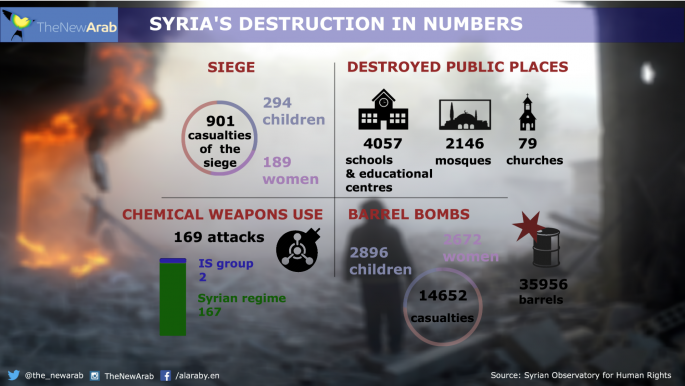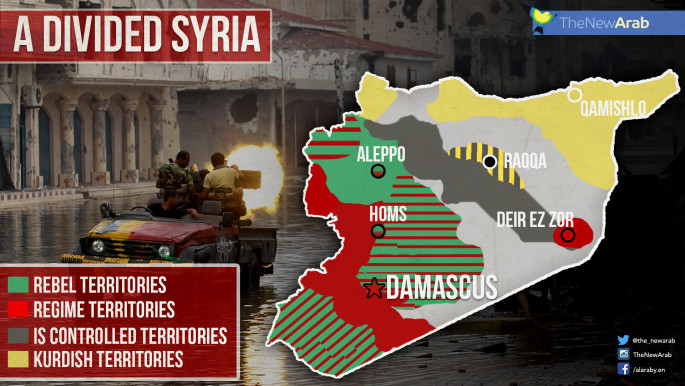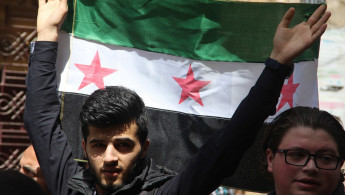Syrian opposition could quit talks amid continued killings, ambiguity
Fighting in Aleppo killed at least 22 civilians as the opposition delegation threatened on Sunday to quit Syria peace talks in Geneva if there is no progress on a political transition.
The opposition High Negotiations Committee said the indirect negotiations could collapse if Syria's regime refuses to compromise on political and humanitarian issues.
"We might suspend (our participation in) the talks if things carry on this way, and then there will be no prospect for any political solution," HNC member Abdulhakim Bashar told AFP.
The opposition's chief negotiator also said there could be "no compromise" on Bashar al-Assad's departure, and called for renewed attacks on regime forces despite a fragile ceasefire.
Meanwhile, the Syrian Observatory for Human Rights said the number of civilians killed in flashpoint Aleppo city was one of the highest single tolls since the truce began on February 27.
 |
The opposition's chief negotiator said there could be "no compromise" on Bashar al-Assad's ouster, and called for renewed attacks on regime forces despite a fragile ceasefire. |  |
The truce has seen violence drop across parts of Syria, including the northern city, but renewed clashes there in the past 24 hours have seriously strained the truce, the Observatory said.
At least six civilians were killed and eight wounded in regime air strikes on rebel-held eastern parts of the city on Saturday.
And a barrage of rockets and sniper fire by opposition groups onto government-controlled western districts killed 16 civilians, including 10 children and two women.
Rebel groups fired more rockets at western areas of Aleppo city late Sunday, but there was no immediate information on new casualties.
 |
At least six civilians were killed and eight wounded in regime air strikes on rebel-held eastern parts of the city on Saturday. |  |
'Direct threat to truce'
"There's a clear escalation. This was the bloodiest incident in Aleppo and its province" since the ceasefire began, Observatory head Rami Abdel Rahman said.
"This escalation directly threatens the truce."
The HNC has questioned the regime's commitment to a political solution to Syria's five-year war, particularly in the wake of the renewed violence in Aleppo.
 |
"The humanitarian situation is continually deteriorating, the issue of the detainees has not seen any progress, the ceasefire has almost collapsed, and now there is an attack on Aleppo from three sides," Bashar said in Switzerland.
"Given these factors, we are reviewing everything, and we will continue our meetings today (Sunday) so that tomorrow we can decide what to do."
A second member of the HNC delegation, speaking anonymously, said the talks were nearly at "an impasse".
"The negotiations have nearly reached an impasse with the intransigent regime's refusal to negotiate the fate of Assad in the Geneva talks," the member said.
 |
Assad's fate has remained the main sticking point in peace talks, with Syria's opposition clinging onto its call for Assad's ouster since the conflict began in 2011. |  |
This has remained the main sticking point in peace talks, with Syria's opposition clinging onto its call for Assad's ouster since the conflict began in 2011.
But the regime has ruled out his departure, calling his fate "a red line".
"There can be no compromise on the issue of Bashar al-Assad... For us, it's a closed book -- you cannot trade an entire people for one man," opposition chief negotiator Mohammed Alloush told AFP in Geneva.
Earlier, Alloush called for renewed attacks on regime forces, despite the shaky truce.
'Strike them everywhere'
"Don't trust the regime and don't wait for their pity," tweeted Alloush, a leading political figure in the Jaish al-Islam (Army of Islam) rebel group.
"Strike them at their necks (kill them). Strike them everywhere."
A fellow opposition figure said Alloush's hawkish statement did not represent the HNC's position.
Alloush himself later told AFP that he had been calling on rebel groups to defend themselves against regime truce violations.
The peace plan outlined by UN envoy Staffan de Mistura and backed by world powers envisions a political transition, a new constitution, and presidential and parliamentary elections by September 2017.
But Syria's government hosted its own regularly-scheduled parliamentary elections last week only in government-held areas, which Assad's ruling Baath party easily won.
The opposition denounced the election as a "farce".
Brokered by Russia and the United States, the ceasefire deal to cease hostilities excludes the fight against the Islamic State group or Al-Qaeda's affiliate in Syria.
The truce had largely held across parts of Syria, despite frequent mutual accusations of violations.
IS has seized fresh territory from rebel groups in the north, threatening the key opposition town of Azaz, just eight kilometres (five miles) south of the Turkish border.
The jihadist onslaught has forced 30,000 Syrians to flee, and tens of thousands more are at risk of displacement.
Since the conflict erupted in 2011, half of Syria's population has been displaced -- including five million who have fled to neighbouring states.
More than 270,000 people have been killed.
 |





 Follow the Middle East's top stories in English at The New Arab on Google News
Follow the Middle East's top stories in English at The New Arab on Google News


![22 Arab countries at COP29 have rejected the targeting of fossil fuels [Getty]](/sites/default/files/styles/image_330x185/public/2024-11/GettyImages-2184289638.jpg?h=199d8c1f&itok=ptHl5bec)